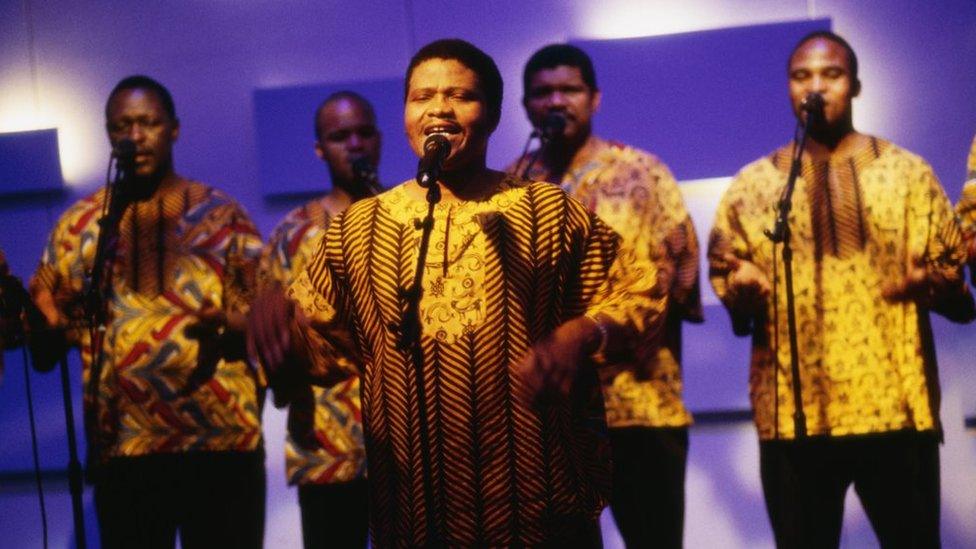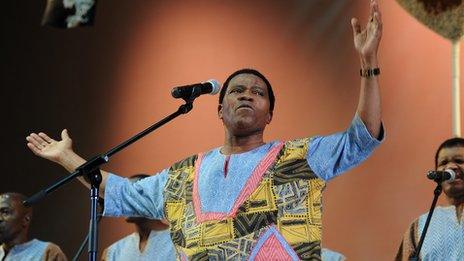Ladysmith Black Mambazo founder Joseph Shabalala dies
- Published

Joseph Shabalala with members of Ladysmith Black Mambazo in 1998
Joseph Shabalala, who helped introduce the sound of traditional Zulu music to the world, has died aged 78.
The musician was best known as the founder and director of choral group Ladysmith Black Mambazo, which won five Grammy awards and featured heavily on Paul Simon's Graceland album.
They also reached number 15 in the UK charts with a cover of Swing Low Sweet Chariot, for the 1995 Rugby World Cup.
Shabalala died in hospital in Pretoria, South Africa, the band's manager said.
"Yes it's true. Mr Shabalala passed on this morning," Xolani Majozi told the South Africa Times, external.
"The group is on tour in the US, but they have been informed and are devastated because the group is family."
In a statement, the band said: "We celebrate and honour your kind heart and your extraordinary life. Through your music and the millions who you came in contact with, you shall live forever."
Allow X content?
This article contains content provided by X. We ask for your permission before anything is loaded, as they may be using cookies and other technologies. You may want to read X’s cookie policy, external and privacy policy, external before accepting. To view this content choose ‘accept and continue’.

The South African government paid tribute to the musician in a tweet, saying, external: "We would like to extend our condolences on the passing of Joseph Shabalala who was the founder of the group Ladysmith Black Mambazo.
It added in Xhosa, "Ulale ngoxolo Tata ugqatso lwakho ulufezile." (Rest in peace, father, your race is complete.)
Ladysmith Black Mambazo remember singing and dancing with Nelson Mandela.
Born in 1941, Shabalala was the eldest of eight children living on a farm in Tugela, near the town of Ladysmith in South Africa.
"When I was a young boy I dreamt of becoming an educated person; maybe a teacher, doctor or something like that," he told South Africa's The Citizen in 2014, external.
However, he was forced to leave school at the age of 12 when his father died, working on the family farm and, later, in a local factory.
In his spare time, he would sing with friends in a local group called the Blacks.
"The young boys when they get together, they started to sing the songs, until the mamas and the neighbours said, 'Hey, do it again,'" he told the BBC.
"It was just like that. They were calling, 'Do it again, do it again'."
Ladysmith Black Mambazo dominated South African Music in the 1970s and 1980s
He eventually became the leader and main composer for the choir, fusing indigenous Zulu songs and dances with South African isicathamiya, an a capella tradition that was frequently accompanied by a soft, shuffling style of dance.
They were re-christened Ladysmith Black Mambazo, a name that was significant on several levels: Ladysmith represented their hometown, Black referenced the black oxen that were the strongest on the farm, and Mambazo, from the Zulu word for axe, symbolized the group's ability to cut down the competition.
A radio performance in 1970 led to a recording contract, and in 1973 they released Africa's first gold-selling album, Amabutho.
They achieved global recognition after being recruited to sing on Paul Simon's multi-million-selling Graceland album, most notably on Homeless, a song Shabalala co-wrote with Simon, based on the melody for a traditional Zulu wedding song.
Allow YouTube content?
This article contains content provided by Google YouTube. We ask for your permission before anything is loaded, as they may be using cookies and other technologies. You may want to read Google’s cookie policy, external and privacy policy, external before accepting. To view this content choose ‘accept and continue’.
The band joined Simon on his subsequent world tour. In return, he produced their next three albums - with 1987's Shaka Zulu winning a Grammy for best traditional folk recording.
Shabalala retired from active performance in 2014 shortly after performing at a memorial concert for Nelson Mandela.
He continued to teach traditional choral music, while four of his sons (and one grandson) continued his legacy within Ladysmith Black Mambazo.
The musician was with his wife Thokozile Shabalala, in his final moments, said Xolani Majozi.
As news of his death spread, tributes poured in from around the world.
"My friend, a giant humble man, Joseph Shabalala, passed away this morning," wrote South African singer Sipho "Hotstix" Mabuse on Twitter, external. "My sincere condolences to his family and friends."
"I am deeply saddened," wrote Herman Mashaba, former mayor of Johannesburg, external. "You will be remembered as a giant of South African music and a pioneer of the industry."

Analysis - Nomsa Maseko, BBC News, Johannesburg
I met the world-renowned musician Joseph Shabalala in Umlazi township in KwaZulu-Natal province a few days before Christmas in 2015.
His home was a hive of activity. Even though he was looking frail, he was teaching traditional choral music to a group of young people who were clearly eager to learn from him.
He was singing Homeless, a song he co-wrote with Paul Simon. He was wearing a red t-shirt and stood in front of a microphone and pulled his famous isicathamiya dance moves. The young people who were seated on white plastic chairs jumped up and joined him in song.
Shabalala will be remembered for playing an unparalleled role in introducing the sound of traditional Zulu music to the world.

Follow us on Facebook, external, or on Twitter @BBCNewsEnts, external. If you have a story suggestion email entertainment.news@bbc.co.uk, external.
- Published23 January 2014
